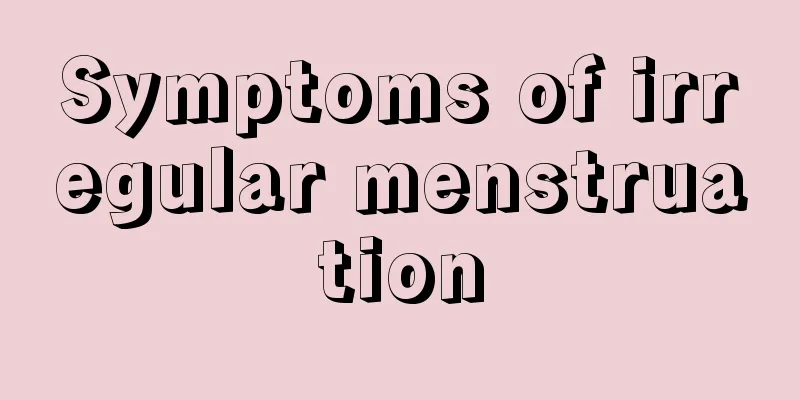Bleeding after about ten days of menstruation

|
After the menstruation ends, women will actually enter the ovulation period due to physiological reasons. Many women will find that they have vaginal bleeding about ten days after their period ends. This is actually ovulation bleeding. Some ovulation bleeding is normal. It is likely that the follicle has ruptured, causing slight bleeding, but it may also be caused by uterine polyps, causing bleeding. The specific reason needs to be checked. Generally, non-menstrual vaginal bleeding is caused by the following reasons: "Ovulation bleeding" is only a small amount of brown secretion, which usually lasts for half a day or 2-3 days, and no more than 7 days at most, and may be accompanied by mild ovulation pain and backache, functional uterine bleeding, which is usually manifested by irregular menstrual cycle, excessive menstrual flow, prolonged menstrual period or irregular bleeding. Vaginal bleeding may also occur after taking emergency contraceptive pills. Emergency contraceptive pills can affect the menstrual cycle, especially repeated users can cause menstrual disorders, bleeding, and continuous bleeding. Cervical tumors: Cervical cancer can also cause bleeding, which starts as contact bleeding and may develop into a small amount of irregular vaginal bleeding. In the late stage, the amount of bleeding increases, and even heavy bleeding may occur. Dysfunctional uterine bleeding: occurs around puberty, during childbearing years, and around menopause. It manifests as abnormalities in the menstrual cycle and menstrual period, with bleeding that may be more or less, sometimes absent, or even continuous. Vaginal tumors, vaginal wall tumors: like vaginal cancer, but generally the amount of bleeding is not much. Vaginal injury and foreign objects in the vagina can also cause bleeding. The vaginal walls of postmenopausal women are very thin, and damage from sexual intercourse can lead to bleeding. Foreign bodies in the uterine cavity: such as residual fetal membranes after cesarean section, which affect the contraction and repair of the endometrium and cause bleeding. Mechanical compression of the intrauterine device can cause local damage, necrosis and superficial ulcers in the endometrium, leading to bleeding. Endometriosis and adenomyosis may also cause bleeding. Uterine lesions: Acute endometritis causes congestion and edema of the endometrium, and in severe cases, it can lead to excessive menstrual flow or continuous vaginal bleeding. Patients with chronic endometritis may experience increased menstrual flow or prolonged menstrual periods, or irregular vaginal bleeding. In addition, endometrial tuberculosis also causes irregular vaginal bleeding. |
<<: What to do with heavy menstruation and what medicine to take
>>: Can I test for pregnancy if I haven't had my period for a few days?
Recommend
Does cin1 need cervical conization?
Cervical disease has always been one of the key d...
Benign postmenopausal bleeding
Normally, women’s menstruation stops and there is...
Sciatica at 34 weeks of pregnancy
In the later stages of pregnancy, pregnant women ...
Is it normal to have your period 7 days early?
Menstruation is also one of the topics that women...
What are the dietary taboos after abortion?
With the continuous progress of society, people&#...
After the abortion, the menstruation ended in one day.
Medical abortion mainly involves women taking med...
How to treat intrauterine adhesions
Many women have gynecological diseases in their u...
Can I take enzymes when I am pregnant?
Enzymes are not unfamiliar to many people. Enzyme...
There is nothing that a good night’s sleep can’t solve. Is there actually a scientific basis for this?
Whenever something annoying or sad happens, your ...
What are the ways to prevent pregnancy-induced hypertension?
After a woman becomes pregnant, her blood pressur...
What are the clinical manifestations of dysmenorrhea?
Many women experience dysmenorrhea. Dysmenorrhea ...
What foods can I eat when I have dysmenorrhea? These foods can actually relieve menstrual cramps!
Dysmenorrhea is a common physiological phenomenon...
HPV in women
In today's society, women's physical dise...
What are the reasons for delayed menstruation?
Some women will encounter many things for which t...









